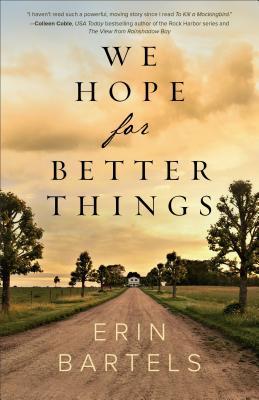
“How do you put into words the feeling that you’re an adult and yet you are utterly lost and confused? How do you say that you don’t know what to do with your life? That it feels like everything you’ve worked for is worthless and yet you don’t know what else to do but more of the same? How do you explain the feeling that your life is over when there’s nothing wrong beyond the fact that you lost a job? How do you say that out loud when innocent people are shot and killers go free and it feels like the very fabric of society is unraveling?” — Erin Bartels, We Hope for Better Things.
I’ve read two of Bartels’s other novels and enjoyed them, so I thought I’d go back to the beginning and check out her debut. It was such a wonderful decision.
When Detroit Free Press reporter Elizabeth Balsam meets James Rich, he asks her to look up an unknown relative to deliver an antique camera and a box of photos. After her investigation into the 1967 riots costs Elizabeth her job, she tracks down her aunt Nora at a 150-year-old farmhouse and moves in to contemplate her next move.
As Elizabeth and Nora pore over the photos, stories of love and sacrifice emerge, and although Elizabeth isn’t the most devout person, she begins to see God’s plan in her history and her future.
In We Hope for Better Things, Erin Bartels takes readers on a captivating journey through time and across generations. The story follows three women, each from a different time, whose lives connected in unexpected ways. She portrays the struggles of abolitionists during the Civil War era and an interracial couple navigating the complexities of 1960s America. Through these interconnected stories, she offers a powerful commentary on the enduring impact of racial prejudice and the resilience of the human spirit.
The way the author blends the past and present is praiseworthy. Through intertwining historical events and contemporary narratives, she has created a novel that is both timeless and relevant.
We Hope for Better Things explores the themes of love, sacrifice, and family bonds. Bartels’s debut is a triumph, showcasing her talent for crafting a story that is both emotional and historically significant. This book stays with you long after the last page. 5 stars!